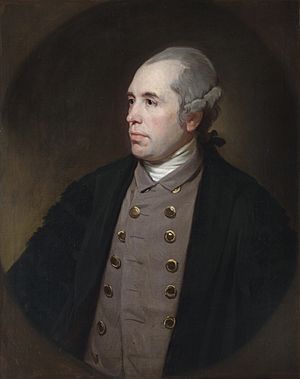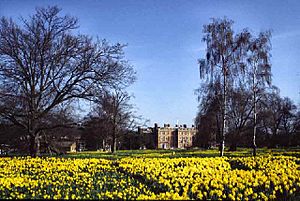Sir Richard Jebb, 1st Baronet facts for kids
Sir Richard Jebb, 1st Baronet (1729–1787) was a famous English doctor. He was well-known for being a successful doctor for important people and even for the royal family.

Richard Jebb was born in Stratford, Essex, in 1729. His father was Samuel Jebb. Richard went to St. Mary Hall, Oxford, to study. Because of his beliefs, he couldn't get his degree there. So, he went to Marischal College, Aberdeen, and earned his medical degree in 1751.
Starting His Medical Career
After finishing his studies, Dr. Jebb moved to Parliament Street, London. In 1755, he was allowed to practice medicine by the Royal College of Physicians. He worked as a doctor at Westminster Hospital from 1754 to 1762. Then, he became a doctor at St. George's Hospital.
Dr. Jebb traveled to Italy to care for the Duke of Gloucester. He became a favorite of King George III. The King even gave him a special lease for Trent Park, a large piece of land with 385 acres in Enfield Chase. Dr. Jebb built a small house there, put a fence around it, and kept deer.
Becoming a Royal Doctor
In 1771, Dr. Jebb became a fellow of the College of Physicians. He was also a censor for the College several times. In 1778, he was given the special title of a baronet, which meant he was called Sir Richard Jebb. He was also a member of the Royal Society and the Society of Antiquaries of London.
By 1768, he had left his hospital jobs to focus on treating private patients. He was very successful! Between 1779 and 1781, he earned about twenty thousand guineas from his patients. In 1780, he was appointed doctor to the Prince of Wales, and in 1786, he became the King's personal doctor.
Sir Richard Jebb had many friends, including John Wilkes and Charles Churchill. He even helped pay for Churchill's son's education. While some people like John Coakley Lettsom criticized him, Sir Richard Jebb was highly respected for his medical skills.
His Final Years
In June 1787, while caring for two of the princesses, Sir Richard Jebb became very ill with a fever. Other famous doctors, Richard Warren and Henry Revell Reynolds, tried to help him. Sadly, he passed away on July 4, 1787, at his home in Great George Street, Westminster.
Sir Richard Jebb was buried in Westminster Abbey. He left most of his property to his younger cousin, also named Richard Jebb, who later became an important judge.


